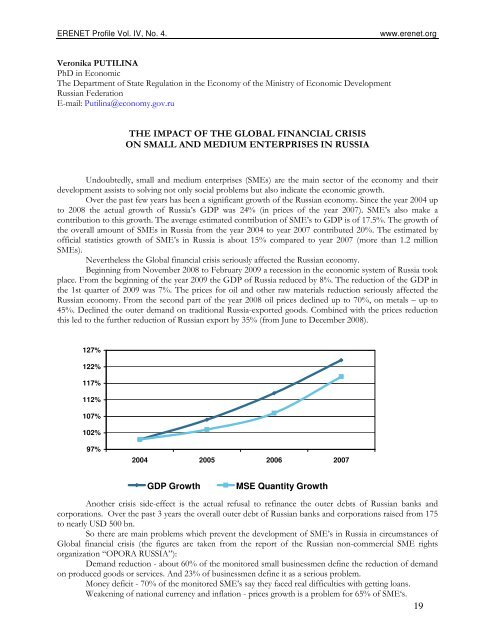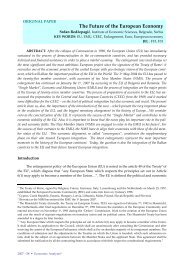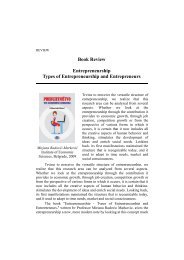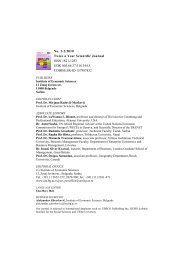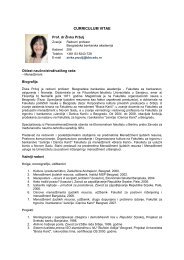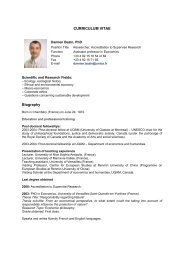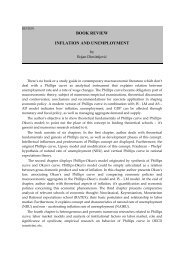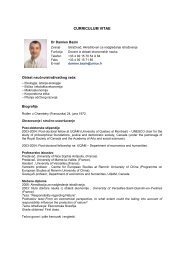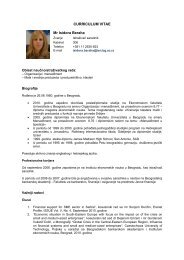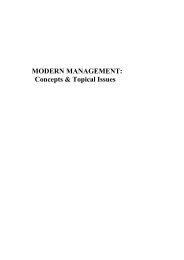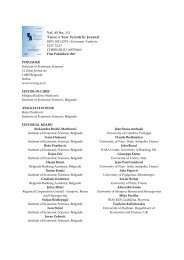Issue 16
Issue 16
Issue 16
Create successful ePaper yourself
Turn your PDF publications into a flip-book with our unique Google optimized e-Paper software.
ERENET Profile Vol. IV, No. 4.<br />
www.erenet.org<br />
Veronika PUTILINA<br />
PhD in Economic<br />
The Department of State Regulation in the Economy of the Ministry of Economic Development<br />
Russian Federation<br />
E-mail: Putilina@economy.gov.ru<br />
THE IMPACT OF THE GLOBAL FINANCIAL CRISIS<br />
ON SMALL AND MEDIUM ENTERPRISES IN RUSSIA<br />
Undoubtedly, small and medium enterprises (SMEs) are the main sector of the economy and their<br />
development assists to solving not only social problems but also indicate the economic growth.<br />
Over the past few years has been a significant growth of the Russian economy. Since the year 2004 up<br />
to 2008 the actual growth of Russia’s GDP was 24% (in prices of the year 2007). SME’s also make a<br />
contribution to this growth. The average estimated contribution of SME’s to GDP is of 17.5%. The growth of<br />
the overall amount of SMEs in Russia from the year 2004 to year 2007 contributed 20%. The estimated by<br />
official statistics growth of SME’s in Russia is about 15% compared to year 2007 (more than 1.2 million<br />
SMEs).<br />
Nevertheless the Global financial crisis seriously affected the Russian economy.<br />
Beginning from November 2008 to February 2009 a recession in the economic system of Russia took<br />
place. From the beginning of the year 2009 the GDP of Russia reduced by 8%. The reduction of the GDP in<br />
the 1st quarter of 2009 was 7%. The prices for oil and other raw materials reduction seriously affected the<br />
Russian economy. From the second part of the year 2008 oil prices declined up to 70%, on metals – up to<br />
45%. Declined the outer demand on traditional Russia-exported goods. Combined with the prices reduction<br />
this led to the further reduction of Russian export by 35% (from June to December 2008).<br />
127%<br />
122%<br />
117%<br />
112%<br />
107%<br />
102%<br />
97%<br />
2004 2005 2006 2007<br />
GDP Growth<br />
MSE Quantity Growth<br />
Another crisis side-effect is the actual refusal to refinance the outer debts of Russian banks and<br />
corporations. Over the past 3 years the overall outer debt of Russian banks and corporations raised from 175<br />
to nearly USD 500 bn.<br />
So there are main problems which prevent the development of SME’s in Russia in circumstances of<br />
Global financial crisis (the figures are taken from the report of the Russian non-commercial SME rights<br />
organization “OPORA RUSSIA”):<br />
Demand reduction - about 60% of the monitored small businessmen define the reduction of demand<br />
on produced goods or services. And 23% of businessmen define it as a serious problem.<br />
Money deficit - 70% of the monitored SME’s say they faced real difficulties with getting loans.<br />
Weakening of national currency and inflation - prices growth is a problem for 65% of SME‘s.<br />
19


